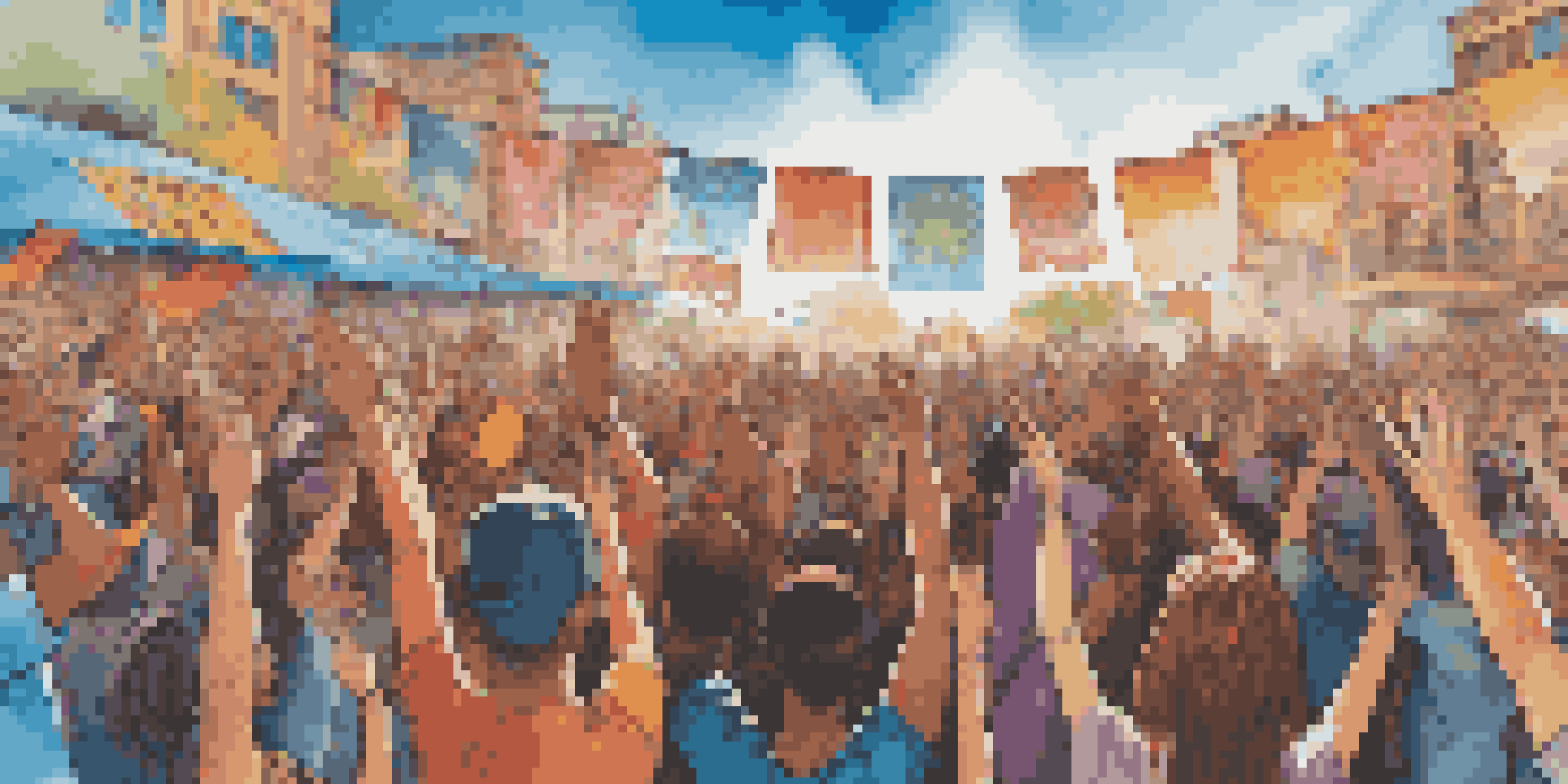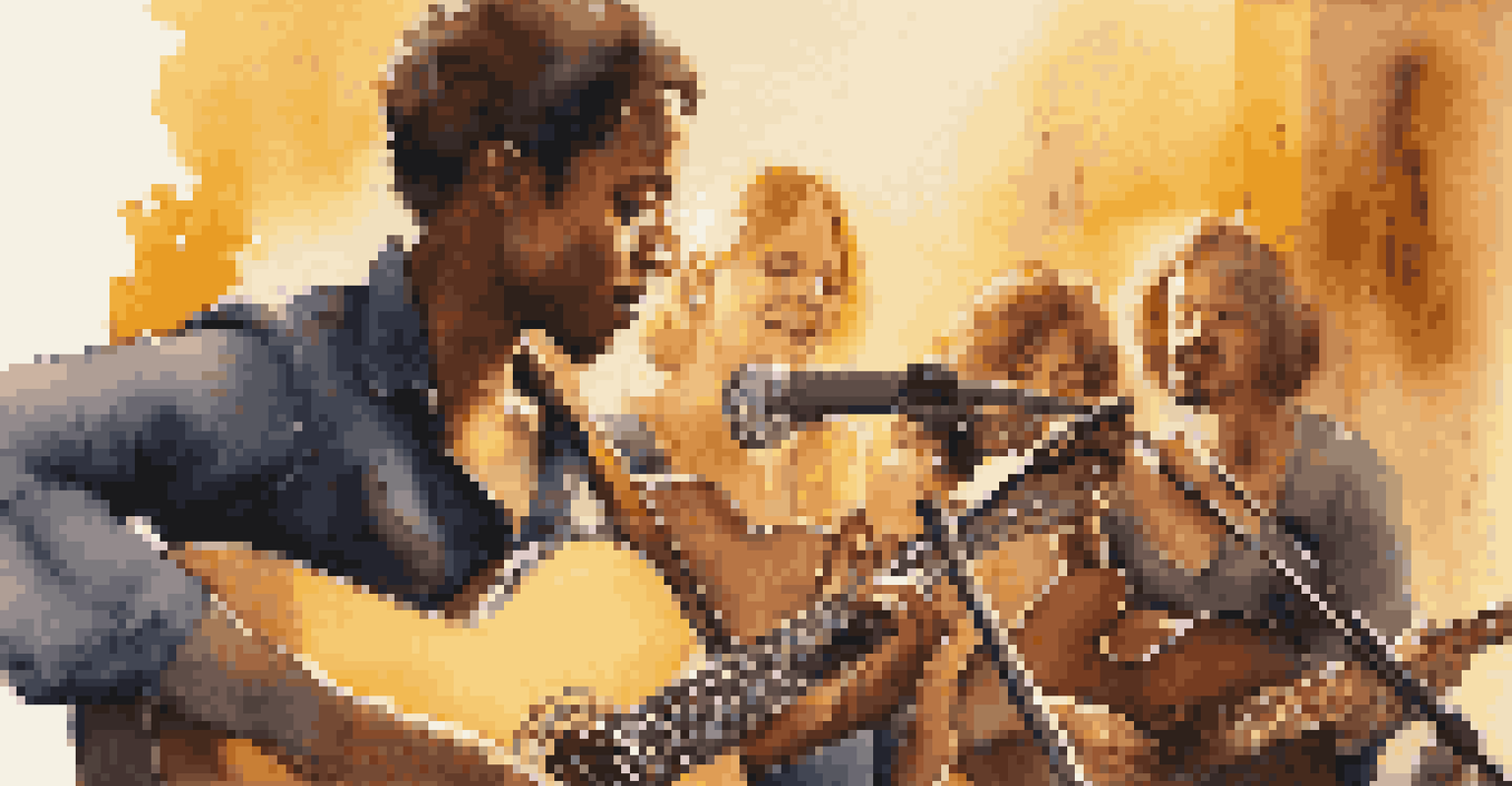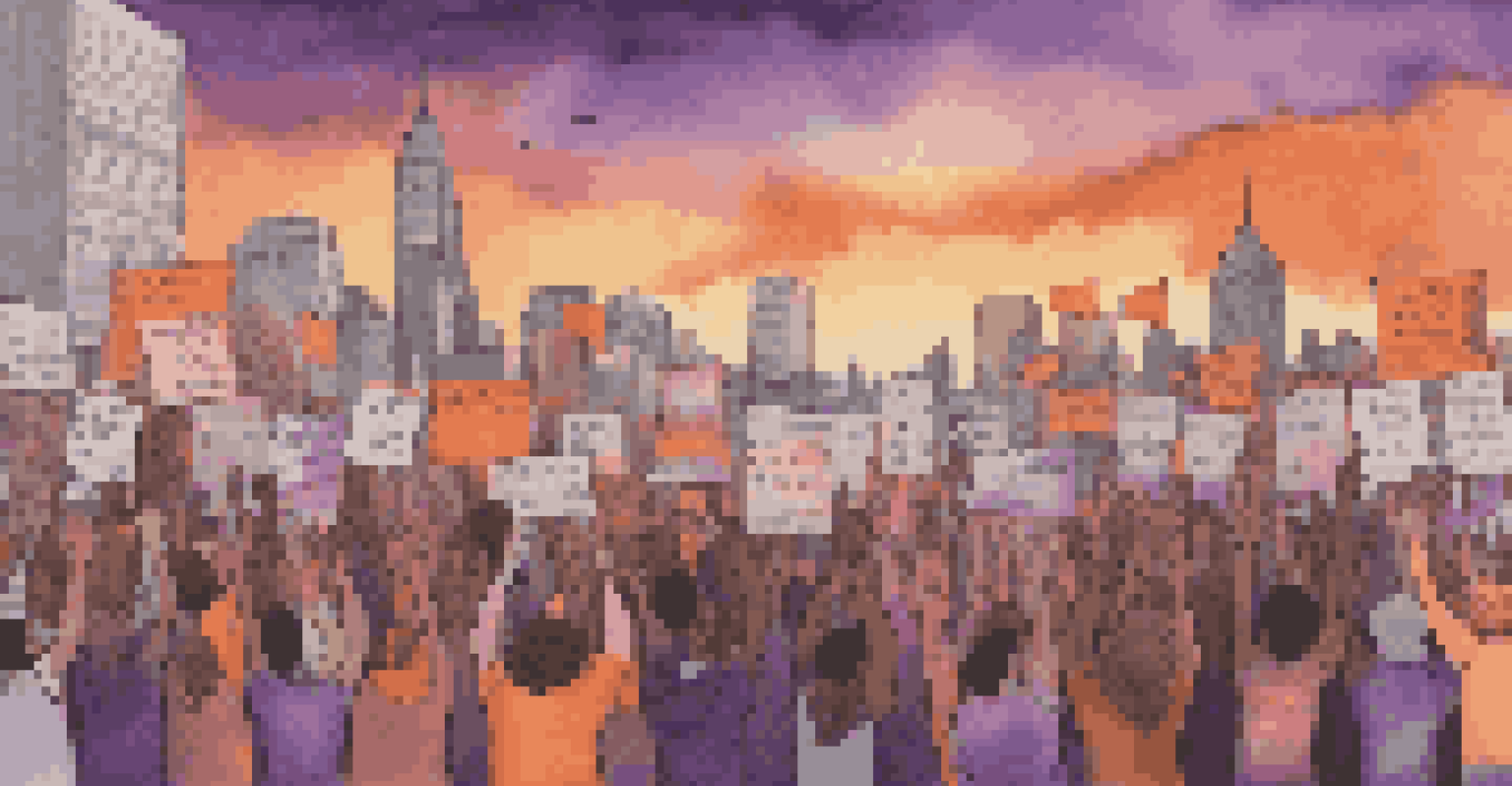Exploring the Role of Music in Social Justice Movements

The Historical Connection Between Music and Activism
Throughout history, music has served as a powerful tool for social change. From the civil rights movement to anti-war protests, songs have united people around a common cause. For instance, the anthems of the 1960s, like 'We Shall Overcome,' became rallying cries for those fighting for equality.
Music can change the world because it can change people.
These musical expressions often provided a sense of hope and resilience, reminding activists that they were part of a larger community. The lyrics resonated deeply, capturing the struggles and aspirations of marginalized groups. By using music, activists could convey complex emotions and messages in a way that words alone often could not.
Today, this connection continues, as contemporary artists utilize their platforms to address social issues through their music. Genres like hip-hop and folk often highlight stories of injustice, making the fight for equity accessible and relatable to wider audiences.
Music as a Means of Expression and Identity
Music allows individuals to express their identities and experiences, often reflecting the struggles they face. For many, songs tell personal stories that resonate with broader societal issues, creating a sense of solidarity among listeners. This powerful expression can foster empathy and understanding across different communities.

For example, hip-hop artists often weave narratives about poverty, racism, and resilience into their lyrics, giving voice to those who feel unheard. These stories can challenge stereotypes and invite listeners to reconsider their views. The emotional weight of such music not only entertains but also educates and motivates action.
Music's Role in Social Change
Throughout history, music has united people and inspired activism, serving as a powerful tool for social change.
Moreover, by incorporating cultural elements into their music, artists can celebrate their heritage while simultaneously advocating for social change. This blend of identity and activism reinforces the idea that music is not just art; it is a lifeline for many communities.
The Role of Protest Songs in Modern Movements
Protest songs have evolved, reflecting the current social landscape and movements. From the Black Lives Matter rallying calls to climate change protests, music remains at the forefront of mobilizing support. These songs create a shared experience, energizing crowds and reinforcing a collective mission.
The power of music makes a difference in the world; it can create a sense of community and a sense of purpose.
Artists like Childish Gambino with 'This Is America' and Billie Eilish with 'Your Power' have highlighted pressing social issues through their work. Their music not only sparks conversations but also inspires listeners to take action. The catchy hooks and poignant lyrics make these messages memorable and impactful.
In many ways, protest songs serve as a soundtrack for activism, capturing the spirit of the times. They remind participants of the values they are fighting for and the unity they share, making music an essential part of any movement.
The Global Influence of Music in Social Justice
Music transcends borders, uniting people across cultures in their fight for justice. Globally, artists use their voices to address issues like human rights abuses, gender equality, and environmental degradation. This universal appeal makes music a potent tool for raising awareness and fostering solidarity.
For instance, international movements like 'One Love' have highlighted issues affecting various communities worldwide. These initiatives leverage music festivals and collaborations to draw attention to pressing social concerns. By featuring diverse artists, they amplify voices that may otherwise go unheard.
Protest Songs Energize Movements
Modern protest songs create shared experiences and motivate action, reflecting current social issues and movements.
The ability of music to connect people from different backgrounds demonstrates its strength as a vehicle for change. When individuals come together through shared melodies and rhythms, they create a powerful force for advocacy and transformation.
The Emotional Power of Music in Activism
Music has a unique ability to evoke emotions, making it an effective tool for activism. The connection between sound and feeling can inspire hope, courage, and determination among those fighting for justice. This emotional resonance helps to drive movements forward, encouraging individuals to persevere in the face of adversity.
For example, uplifting anthems can boost morale during protests, turning moments of despair into celebrations of resilience. Songs that convey messages of unity can remind participants of their shared goals, fostering a sense of belonging. These emotional highs can be critical during challenging times.
Moreover, the therapeutic aspects of music allow individuals to process their feelings about social issues. Singing together or listening to powerful lyrics can provide solace and motivation, reinforcing the idea that they are not alone in their struggles.
The Impact of Technology on Music and Activism
With the rise of digital platforms, the relationship between music and activism has transformed significantly. Social media allows artists to share their messages instantly and reach global audiences. This accessibility empowers movements, enabling people to mobilize quickly and effectively.
Platforms like YouTube, Spotify, and TikTok have also created spaces for emerging artists to showcase their work. Many new musicians are using these platforms to address social issues, spreading awareness through viral songs and videos. This democratization of music means that more voices can contribute to the social justice narrative.
Festivals Amplify Activism Messages
Music festivals serve as platforms for social change, blending entertainment with education and advocacy for important causes.
However, this shift also presents challenges, such as the potential for messages to become diluted or misinterpreted. It's crucial for artists and activists to remain authentic, ensuring that their work maintains its integrity while still reaching a broad audience.
Music Festivals as Platforms for Social Change
Music festivals have become significant platforms for raising awareness about social justice issues. Events like Coachella and Glastonbury often feature artists promoting various causes, turning entertainment into activism. These gatherings create a unique space for education and dialogue, encouraging attendees to engage with important topics.
By incorporating panels, workshops, and discussions into festival programming, organizers can foster deeper connections between music and activism. For example, the Global Citizen Festival focuses on issues like poverty and climate change, blending live performances with powerful calls to action. This combination amplifies the message and inspires attendees to get involved.

Ultimately, music festivals not only entertain but also educate and empower participants. They remind us that art and activism can go hand in hand, creating a dynamic environment for social change.